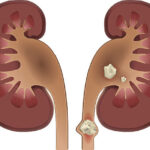A kidney problem can quickly lead to other health problems if left untreated. Reports say kidney disease is one of the leading causes of death in the United States. Therefore, if you have a history of kidney disease or have symptoms, don’t hesitate to reach out to a kidney doctor. Depending on the intensity of the damage, there are also different treatment options to consider. Thekidney doctors ... Read More ->
Welcome to Our Blog
Kidney Stones Treatment According to Stone Type
Do you feel pain along your belly or lower back? Has it been challenging to go to the bathroom? There may be a chance that you have kidney stones. They can result from several things and can vary in size. Fortunately, a doctor known as a nephrologist can recommend treatments based on the kind of kidney stone you have. What Are The Different Types of Kidney Stones? Calcium Stones Calcium stones ... Read More ->
Want to Avoid Kidney Stones? Here’s How
Nobody likes pain. The pain of kidney stones, in particular, can be excruciating. It’s been likened to the pain of childbirth – or described as being repeatedly stabbed in the side and back. If you’re a kidney stone survivor, you’re well aware of how painful it can be, and you probably already know that you now have an increased risk of having a repeat episode – especially if the root cause of ... Read More ->
Laboratory Tests Done Prior to Chronic Kidney Disease Treatment
Chronic kidney disease (CKD) is a growing public health concern in the United States. According to the National Institute of Diabetes and Digestive and Kidney Diseases (NIDDK), CKD affects more than 1 in 7 American adults. If you have any of the risk factors for kidney disease, such as hypertension, diabetes, and/or family history, it is imperative that you see a doctor, particularly a ... Read More ->
Does a Nephrologist Do Surgery?
A nephrologist is a physician who has specialized training in the structure, function, issues, diseases, and treatment of the kidneys. Usually, kidney doctors do not perform complex surgeries, but they can utilize state-of-the-art diagnostics to pinpoint and treat kidney dysfunction. Let’s talk about this vital medical specialty, what a nephrologist can do for you, and where you can go in ... Read More ->






